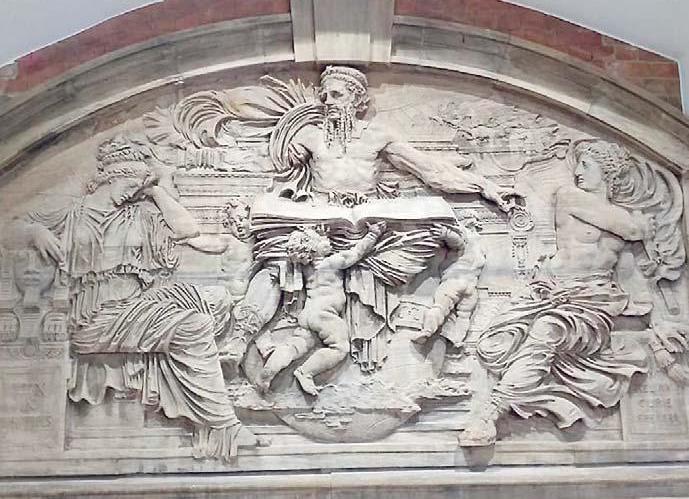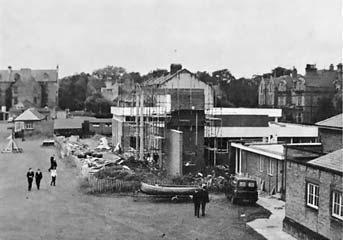
6 minute read
MY BURSARY STORY MICHAEL DOCHERTY


Advertisement

MY BURSARY STORY
BY MICHAEL DOCHERTY (97-07)
Areminiscence on my time in the Junior School? No problem. After all, it hasn’t quite been 14 years since I first donned the blue blazer and travelled the 18 miles down the A189 from Ashington to Lambton Road. Hang on, though. That’s not right, is it? Try a terrifying 24 years. Perhaps readers of my generation have also begun to notice this strange phenomenon. Since hitting 30, time keeps erasing or compressing itself in my memory, so that leaving the Sixth Form in 2007 feels as if it must’ve been roughly a decade ago, but so does starting Year Four in 1997.
There’s a paradox here: on one hand, I’m convinced that my days at school cannot have been as long ago as they were, but I am simultaneously aware that they have begun to recede in my memory faster than the hair on my head. Until a few years ago, my Junior School days still shone in my mind—for better and for worse—with sharpness and clarity. The memories had a level of detail by which I was assured that they were still proximate. Now, though, things are getting fuzzier. I forget names, specifics, dates. This is what nostalgia is: a perspective from which objects in the mirror are both closer and further away than they appear. There’s a deep sadness in that, one that I’m sure is familiar to older readers. I was grateful, therefore, for this opportunity, to put some recollections on paper before they lose any more of their shape.
One moment I shall never forget in fact precedes my arrival at the RGS. It’s a dark winter’s evening and my father calls me to his side. Quietly, he tells me about a school in Newcastle, a school for bright children. He, my mother, and my teachers at the local state first school think I might like it there, he says, but I would have to pass a test to get in. Do I want to try it? Of course I do: at that age I have no fear of intellectual failure and, having never so much as heard of the RGS, no preconceptions or expectations about the school or what it means to earn a place there. As an insufferable little nerd, all I see is a chance to show off.
What strikes me now about that chat with my father is what he didn’t mention, namely what a private school is and how much it costs to attend one. At that time, my father was a guitar maker and my mother ran a wool shop: I do not imagine that an RGS careers adviser has ever recommended either of those occupations as routes to financial security. Had my parents been required to bear the full cost of my education, my attendance would have been out of the question, but I got lucky. I entered the RGS in the very last year of the Assisted Places Scheme, and thereafter I was fortunate to transition to a bursary.
In an era of so much urgently necessary debate around social privilege and the role of private schools in entrenching such privilege, it’s impossible for someone who had my luck not to be nagged by an uncomfortable question. Had I not been granted a bursary, had I remained in the state system, would I have achieved what I have? Would I have read English at Oxford? Would I have undertaken a PhD? Would I have become a Fulbright Scholar? Would I now be embarking on my chosen academic career as a scholar of American literature? I’d like to flatter myself that talent would have won out, but the world is not as straightforward or meritocratic as we might wish it.
What I know with certainty are the many times since leaving school in which I have drawn on the experiences of my very earliest days at the RGS. Whenever I stand before a class of eager students to deliver a lecture, for example, I smile as I remember how I was introduced to the pleasures of drama by Brenda Joy. I remember the Victorian Music Hall of Year 4 and Treasure Island of Year 5, the roar of the greasepaint and the smell of the crowd. I’m a good lecturer because I know how to engage an audience, because I’m happy to ham it up a little, because I’m unembarrassed about treating the task as acting. I learnt how to act from Brenda, treading the worn boards of the old theatre in the pre-PAC days.
It’s a cliché but a justified one that great teachers change lives. In 10 years at the RGS I was lucky enough to have several across multiple subjects—among them Simon Tilbrook in History, Maria Elliott in Art, Howard Baker in Religious Studies, and Lindsey Boucaud in French. In English, though, my greatest passion, I crossed paths with inspiring figures with especially remarkable frequency. Absent their encouragement of my enthusiasm and their confidence in my abilities, I cannot imagine that literary study would be my trade today. With Simon Barker, Hazel Jones-Lee, and Jean Ross in the Senior School I steadily honed my critical faculties, but the die had already been cast in Junior School English—by Andrea Mayland, by John Wood and again by Brenda Joy.
Here’s one memory that remains painfully sharp. In Year 4, we wrote poems about the eruption of Vesuvius. I thought mine was great. Frankly, for the work of an eight-year-old, it was. Brenda thought it was good, too, but not perfect. Describing the citizens of Pompeii going about their lives, unaware of the terror about to befall them, I’d written of ‘people at the theatre, seeing plays’. Brenda pointed out that this was tautological, redundant, lazy writing. Of course they were seeing plays, what else would they be doing at the theatre? Think of something else, Michael. Make it better. I duly did, although initially I was hurt, even offended by the critique. Prior to my arrival at the RGS I was unaccustomed to being told that my work could stand improvement. The point, though, was that Brenda pushed me where previous teachers hadn’t, and she did so because she knew I was capable of more. She recognised someone who could reach ‘good’ by his own volition, but who could achieve ‘better’ and perhaps even ‘best’ with the right support—and she had the time and resources to grant that support. That is precisely what the RGS at its own best can offer, where less wellresourced schools cannot. That is its singular advantage. That is what it gave me.
If the school is to be a force for good—and if it is not then it is nothing—it must continue to extend that advantage to the broadest possible constituency of students. It should be unconscionable to any alumnus of the school that any talented young person should be denied on the basis of cost the education from which we so richly benefited. The RGS can be an institution that, far from than entrenching privilege, dismantles it. It cannot be such an institution, however, without a flourishing bursary scheme.
Entrance to the Junior School on Lambton Road











